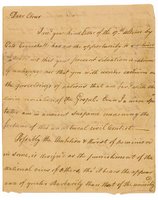 Last week, New York's Swann Galleries auctioned off one of the rarest and most important African-American and American literary artifacts, a signed letter (front page shown at left) by the first published Black poet in the United States (and the second woman), Phillis Wheatley (c. 1753-1784). This is the only letter of Wheatley's every to have gone on auction. As news commentator Ed Gordon remarks on his NPR News and Notes radio program, Wheatley was born in Senegal and sold into slavery to the family of John Wheatley of Boston in 1761. By 1767, she had published her first poem in the Newport, Rhode Island Mercury, and in 1773, she published her landmark collection, Poems on Various Subjects, Religious and Moral (London: Printed for Archibald Bell and Sold in Boston by Cox and Berry, engraving from frontispiece show below), which, before it could gain subscriptions (which was the way most books were sold in those days) required an "attestation" to her authorship by various prominent White residents of Boston.
Last week, New York's Swann Galleries auctioned off one of the rarest and most important African-American and American literary artifacts, a signed letter (front page shown at left) by the first published Black poet in the United States (and the second woman), Phillis Wheatley (c. 1753-1784). This is the only letter of Wheatley's every to have gone on auction. As news commentator Ed Gordon remarks on his NPR News and Notes radio program, Wheatley was born in Senegal and sold into slavery to the family of John Wheatley of Boston in 1761. By 1767, she had published her first poem in the Newport, Rhode Island Mercury, and in 1773, she published her landmark collection, Poems on Various Subjects, Religious and Moral (London: Printed for Archibald Bell and Sold in Boston by Cox and Berry, engraving from frontispiece show below), which, before it could gain subscriptions (which was the way most books were sold in those days) required an "attestation" to her authorship by various prominent White residents of Boston.The transcript of the letter, written during the year of the Declaration of Independence, reads:
Dear ObourI rec.d your kind Letter of the 17th ultimo by Cato Coggeshall; had not the opportunity to see him. I doubt not that your present situation is extremely unhappy; nor that you with wonder exclaim on the proceedings of nations that are fav.d with the divine revelation of the Gospel. Even I a mere spectator am in anxious suspense concerning the fortune of this unnatural civil Contest.
Possibly the ambition & thirst of Dominion in some is design'd as the punishment of the national views of others, tho' it bears the appearance of greater Barbarity than that of the uncivilz'd (page 2) part of mankind. But Let us leave the Event to him whose wisdom alone can bring good out of Evil & he is infinitely superior to all the Craftiness of the enemies of this seemingly devoted Country. This is handed to you br Mr. Lingo, with whom I and Mr. Quamine I passed the last evening very agreeably.
Dutiful respects to Mr. Hopkins & family and believe me to be your affectionate
P. Wheatley
Providence Feby 14, 1776

The Swann gallery catalogue notes that Wheatley addressed this letter to Obour Tanner, her friend and "sister" slave; from what I can tell, several of the names mentioned in it (Cato, Mr. Quamine, which sounds Akan, like Quabena/Quamina, etc.) seem to point to West African origins, so she's referring to fellow Black New Englanders in it.
The letter, which was estimated to sell for between $80,000 and $120,000 eventually sold for $253,000 to an anonymous bidder. As Felicia Lee reports in her New York Times Arts Briefly article,
That price, which includes a 15 percent commission, was the highest ever paid at auction for a letter written by an African-American, and appears to have set an auction record for a letter written by a woman, said Jeremy Markowitz, an autograph specialist at Swann Galleries in New York, which sold it. The two-page letter is considered especially valuable because in it Wheatley talks about the American Revolution, and obliquely about slavery, and because it was written to an enslaved friend, Obour Tanner, in Newport, R.I. "This is a happy day for those of us who love African-American literature," said Henry Louis Gates Jr., chairman of the department of African and African-American studies at Harvard.
According to a press release that was forwarded to me, the buyer supposedly has a large collection of African-American literary and cultural artifacts, which I find heartening. I hope that the person eventually makes available or donates these treasures to an institution that will then make them available not only to researchers, but to everyone who wishes to view them (while protecting them from damage, of course). This relic of Wheatley's life and humanity, and this treasure of African-American history and culture, deserve the widest possible audience.
***
They just never cease their tireless work in this Land of Freedom, these moral arbiters. Our own American Taliban, also known as the Citizens for Literary Standards in Schools, are indefatigable. What do I mean? Once again they're trying to ban, er, remove/opt out of having young people read texts they find objectionable. What's objectionable about these texts? you ask? Well, according to these moral censors, these works of fiction and nonfiction are "salacious," and they charge that they're being assigned as "required" reading.
Here's the list:
- All the Pretty Horses
- Animal Dreams
- The Awakening
- The Bean Trees
- Beloved
- Black Boy
- Fallen Angels
- The Hot Zone
- I Know Why the Caged Bird Sings
- Lords of Discipline
- One Flew Over the Cuckoo’s Nest
- Song of Solomon
- Stotan
- This Boy’s Life









No comments:
Post a Comment